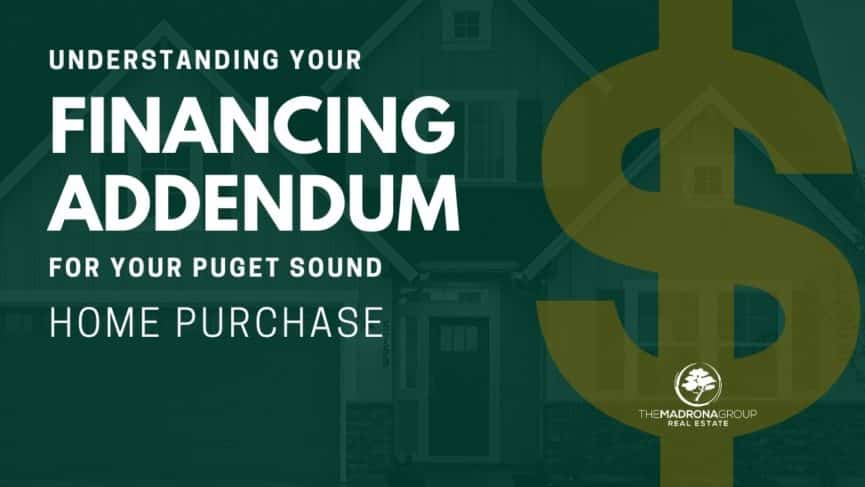When Financing Your Puget Sound Home Purchase, Getting A Mortgage Is Only The First Step
Making sure you have measures in place when entering into a Purchase and Sale Agreement requires a strong understanding of the financing addendum.
In this post, I will go through all the contingency options as well as accompanying notices and forms every home buyer should be familiar with in order to protect their position in the transaction and understand the financing addendum.
Given that this form is arguable viewed as heavily focused for the Buyer, I will also point out those options that are available to the home seller to protect them as well.
(NOTE: Paragraphs 2 & 3)
Below I will identify and outline the 9 Paragraphs that govern this form. I will also bring to your attention the sub paragraphs and additional forms and notices that accompany the Financing Addendum!
What is the Financing Addendum to Purchase and Sale Agreement NWMLS Form 22A?
When financing your home purchase, the home buyer needs to give vital information to the home seller. The Financing Addendum sets forth check box and fill in options so both parties are aware of what is clear and binding.
PARAGRAPH 1 – Loan Application/Waiver of Contingency

First off, by attaching this addendum to the Purchase and Sale Agreement, the home buyer is making it a condition they are obtaining a loan or loans to purchase the Property.
Check box items and areas to fill in are included in sub paragraph (a) and must be identified to inform all parties the following:
- Type of Loan the Buyer will be obtaining
- Conventional (First)
- Conventional (Second)
- Bridge
- VA
- FHA
- USDA
- HELOC (Home Equity Line of Credit)
- Other
- The Buyer’s down payment amount
- This can be a fixed amount
- Or; a percent of the Purchase Price
This information as well as the actual application for the type of loan or loans must be made within an agreed upon time frame. This time frame defaults to 5 days and the term ‘application’ means the submission of Buyers’ financial information for the purposes of obtaining an extension of credit including:
- Buyer’s Name(s)
- Income
Security Number (if required) - Property Address
- Purchase Price
- Loan amount
The Financing Addendum clearly sets a waiver in sub paragraph b if Buyer:
- Fails to make application for financing for the Property within the agreed time line
- Changes the type of loan at any time without Seller’s prior WRITTEN consent
- Changes the lender without Seller’s prior WRITTEN consent after the agreed upon time to apply for financing expires
If any of these 3 above items occur, then the Financing Contingency shall be deemed waived! This is clearly not in the best interest of the Buyer as waiver of this contingency also waives the Appraisal Less Than Sales Price paragraph which I will identify later in this post.
PARAGRAPH 2 – Loan Information

This paragraph is put in place as a mechanism of communication so the Seller (and Buyer) are kept informed as to the state of the Buyers loan status. There are 2 NWMLS Forms that are used to obtain this:
(a) NWMLS Form 22AL – Request for Loan Information.
This form may be given to the Buyer any time after an agreed upon time frame, 10 days by default, after mutual acceptance.
(b) NWMLS Form 22AP – Loan Information Notice.
The Buyer has an agreed upon time frame to give Seller notice, 3 days by default, and include the following:
- Date of Application
- Name of Lender
- A List of information that Buyer has provided to Lender
- And a warranty that Buyer has provided all information requested by Lender
There is a 3rd sub paragraph (c) that allows for the Seller to Terminate the Agreement if the Buyer fails to give the completed NWMLS Form 22AP. This would be done on a NWMLS Form 22AR. This action may be the only way to get a Buyer to $h!+ or get off the pot…I heard that saying somewhere.
PARAGRAPH 3 – Seller’s Right to Terminate

This paragraph, as you can imagine, is put in place as a mechanism of communicating to the Buyer of the Sellers intent to kill the deal!
Sadly, this is the Seller’s only real recourse in the event buyer is unable or unwilling to give notice of waiver of the Financing Contingency
It’s also a paragraph that contains information many real estate brokers may not be aware that ‘technically’ gives the Buyer a right to rescind even after the closing date (if the transaction fails to close based on a hold up in the financing process).
See line item 41 of the above screenshot
IF THE SELLER DOES NOT ELECT TO TERMINATE BY WRITTEN NOTICE DURING THE COURSE OF THE TRANSACTION, AND THE BUYER FULFILLS THEIR OBLIGATIONS TO MAKE APPLICATION WITHIN THE AGREED UPON TIME FRAME, THE FINANCING CONTINGENCY SHALL SURVIVE THE CLOSING DATE.

As you can see, the first two options are in order of how the parties can and will proceed. First, the Seller will give notice of their option to terminate the agreement any time 3 days after delivery. You still see some ambiguity in the language as this option says that the Seller MAY terminate as well as ANY TIME after 3 days after delivery. More a less, a ‘shot across the bow’ if you will to get the Buyers attention.
The second option is a bit more concrete! This may be used if the the first option goes unanswered by the Buyer. The Seller may also elect to skip the first option and go right for it! A bolder move and one that essentially kills the deal.
Lastly, if option one is successful for the Seller, the Buyer does have the option in this notice to waive their financing contingency!
PARAGRAPH 4 – Loan Cost Provisions

This paragraph is simply put in place to identify if the Seller is going to apply any amount or percentage of the purchase price to the Buyers loan and settlement costs…these may include:
- Prepaids
- Loan Discount
- Loan Fee
- Interest Buydown
- Financing
- Closing Costs
- Or, any Settlement Costs allowed by the Buyers Lender
PARAGRAPH 5 – Earnest Money

Remember that little paragraph I talked about in Paragraph 3, line item 41 regarding the Financing Contingency surviving closing if the Buyer doesn’t waive their Financing Contingency?
Well, here in paragraph 5, line item 50, you see right out of the gate, the language that keeps the Buyers Earnest Money in their pocket should they be unable to obtain financing and fail to close after a good faith effort. Of course, the Buyer must produce written confirmation from their lender stating the following:
(a) The date of the Buyers loan application
(b) Buyer did have sufficient funds to close
(c) And the reason why the Buyer was unable to obtain financing
PARAGRAPH 6 – Inspection

Very simply a paragraph essentially mirroring the Inspections Contingency
PARAGRAPH 7 – Appraisal Less Than Sale Price

After a few simple paragraphs, we are back to serious language that speaks to the appraisal of the home. If, in deed, the appraisal comes back below value, then the Buyer would issue a NWMLS Form 22AN Notice of Low Appraisal.
There are 5 options on this notice, the first of which is specific to the Buyer.
Once this notice has been given to the Seller, they (the seller) now have 3 options to address the low appraisal:
REAPPRAISAL/RECONSIDERATION OF VALUE
This may also be a good moment to consider a couple of good reasons for having your home appraised prior to listing it. The first of which is you have an appraisal in hand at value…considering you listed your home and accepted an offer at or below the appraised value. Secondly, this would be a great tool if the seller is concerned about their value or simply unsure of what the value of their home is.
NOTE: Appraised value and market value can be arguably two different things! Hiring a seasoned real estate professional is always advisable in this instance.
REDUCTION IN PURCHASE PRICE
Here the seller has the simple option of reducing the purchase price to the appraised value.
REJECTION OF LOW APPRAISAL
This course of action may be taken in the event they (the Seller) do not want to allow for a reappraisal or reduction in purchase price. I’d also take this response from the sellers to mean they may have another Buyer or an all cash offer of some kind in the wings!

The final option is for the Buyer and it clearly indicates whether this deal will move forward or die a quick death.
PARAGRAPH 8 – FHA/VA/USDA – Appraisal Certificate

Going back to paragraph 1, it would be advisable if the Buyer check any of the boxes FHA, VA or USDA to be aware of this paragraph and its effects.
PARAGRAPH 9 – Extension of Closing

Another provision protecting the Buyer in the event the Lender is required by 12 CFR 1026 or Regulation Z to give a corrected disclosure based on the following:
(a) A change in the APR of Buyers Loan by more than .125% of a fixed rate loan or .250% for an adjustable rate loan
(b) A change in the loan product
(c) Or an addition of a prepayment penalty
SUMMARY
The purpose of this article is to inform and educate the home buyers and sellers (and likely a few real estate professionals I’d imagine) on the finite language and recourse afforded both parties when using the NWMLS Form 22A Financing Addendum to Purchase and Sale Agreement.
When Financing your home purchase, it’s always wise to consult a seasoned and knowledgeable real estate professional to help you go over and understand your responsibilities.
At The Madrona Group with John L. Scott, we take this very seriously because we know this is a major step in most folks lives. I hope that this helps you understand the financing addendum and if you have any additional queries regarding any of this, please do not hesitate to reach out to us.
Share this post!





5 Comments on “Understanding The Financing Addendum For Your Puget Sound Home Purchase”
Excellent post and thorough explanation of the financing contingency. One section that i am somewhat confused by is the section 3 or paragraph 3. From a buyers perspective if they do not waive financing contingency and sellers do not ask them to. Does it matter what a buyer chooses to do in the section C. where it notes that it “will” or “will not” constitute waiver of appraisal less than value paragraph? And secondly, if a seller DOES ask them to waive this and the buyers choose to check the box “will not,” that still protects the buyer in case of low appraisal, but they’re still on the hook for if lending has an issue?
Thanks for reaching out RJ!
Let me see if I can untangle this form for you. Essentially, waiver of the financing contingency does not mean the buyer is held responsible (risk losing their earnest money or allow sellers election to remedy) if the home appraises at less than value. Of course, the lender will not loan on the home if it does not come in at value.
Same holds true for the second question…
I hope that helps RJ and thanks again for your comment.
Thanks Pat!
I’m probably a year out from where i need to be to get ready for the buying process, but i fell in the rabbit hole of trying to do my early homework before deciding to dive into this crazy market!
Wow! There are a lot of exclamation points in your copy! It makes very little sense that way!
Hey Jeff. Sorry that bothers you. Hope all is well.